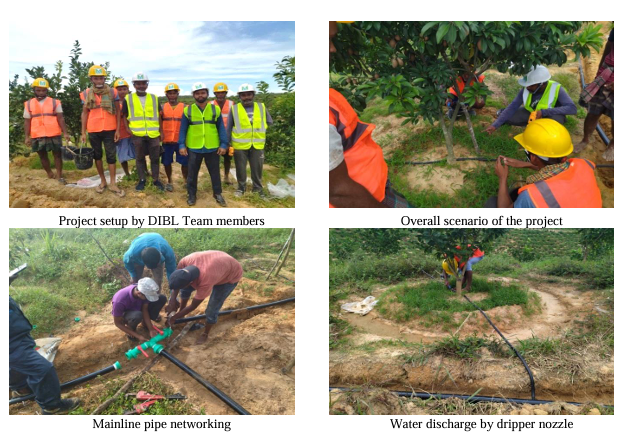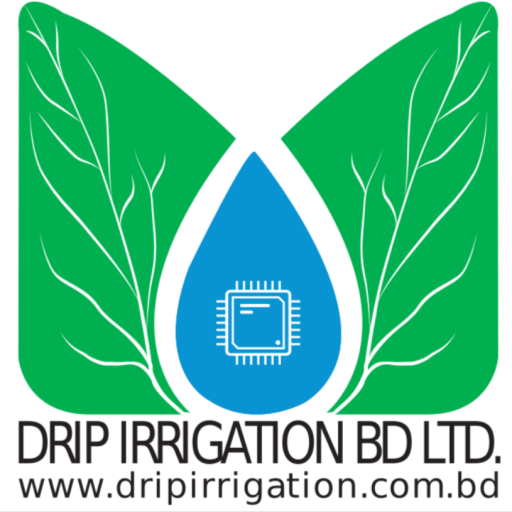Imagine transforming arid lands into thriving agricultural hubs with just a few pipes and drippers. That’s precisely what Drip Irrigation BD Ltd. (DIBL) achieved in a recent project, showcasing the power of efficient irrigation in Bangladesh. We’re diving into the details of this groundbreaking initiative, its impact on local farmers, and how it’s setting new standards for sustainable agriculture.

Project Details:
Overview: This project involved setting up a mainline pipe network and installing dripper nozzles to efficiently discharge water for crop irrigation. Implemented by the DIBL team, it addressed the critical issue of water scarcity in agriculture, particularly impacting farmers in regions facing water stress.
Technical Description: The system utilizes a network of mainline pipes that deliver water directly to the base of plants through dripper nozzles. This method significantly reduces water wastage by minimizing evaporation and runoff. The setup is straightforward, allowing farmers to install it themselves or with the help of local technicians. DIBL engineers are also available to provide assistance, ensuring a smooth installation process.
Key Benefits for Farmers & Entrepreneurs:
Water Efficiency: Studies show that drip irrigation can reduce water usage by up to 60% compared to traditional flood irrigation. This is crucial in regions facing water scarcity. As one farmer noted, “Since switching to drip irrigation, I’ve seen a dramatic reduction in my water bills, and my crops are healthier than ever.”
Crop Yield Improvement: Crops like mangoes, coffee, and cashews benefit significantly from drip irrigation. The precise water delivery ensures that plants receive the optimal amount of moisture, leading to increased yields and better quality produce. “My mango yield has increased by 40% in just one season,” a local farmer reported.
Cost Savings: By reducing water usage and minimizing the need for fertilizers and pesticides, farmers can significantly cut down on operational costs. The reduced weed growth also lessens the need for herbicides and manual weeding.
Automation & Smart Features: Modern drip irrigation systems can be integrated with timers and IoT devices, allowing for remote monitoring and automated watering schedules. This saves time and labor, freeing up farmers to focus on other essential tasks.
Long-Term Sustainability: Drip irrigation promotes soil health by preventing erosion and maintaining optimal moisture levels. This leads to more sustainable agricultural practices and healthier ecosystems.
Weed Control: The targeted water delivery of drip irrigation minimizes weed growth, reducing the need for herbicides and labor-intensive weeding.
Time and Labor Savings: Automation and efficient water delivery significantly reduce manual labor and time spent on irrigation.
Initial Investment vs. Long-Term Savings: While the initial investment for a drip irrigation system may be higher, the long-term savings in water, fertilizer, and labor costs make it a worthwhile investment. One farmer shared, “Initially, I was hesitant about the cost, but within two years, the savings paid for the entire system.”
Real-Life Impact & Success Stories:
Testimonials: “DIBL’s drip irrigation system has transformed my farm. I’ve seen a significant increase in yield and a reduction in water usage,” shares a farmer from the project site.
Statistics: “Farmers using DIBL’s system have reported an average yield increase of 35% within six months,” according to a recent field study.
Incentives: The project has also benefited from government subsidies, making it more accessible to local farmers.
Inspiration & Business Opportunities:
Implementation Guidance: Farmers and entrepreneurs can replicate this success by partnering with DIBL, which offers comprehensive support and training.
Investment Opportunities: The growing demand for efficient irrigation solutions presents significant investment opportunities in this sector.
Startup Tips: Agribusiness startups should focus on providing affordable and sustainable irrigation solutions, leveraging technology and innovation.
Geo-Location Details:
Location: The project was successfully implemented in a region of Bangladesh, demonstrating its effectiveness in local conditions.
Call to Action (CTA) & Company Contact Details:
Interested in implementing a cost-effective irrigation system? Contact us today!
Company Information:
Email: info@dripirrigationbd.com | Website: www.dripirrigation.com.bd Head Office Address: 2C/81, Parijat Apartment, North Adabor, Shyamoli, Dhaka-1207 Phone: 01324-445400 | Email: dibldhaka400@gmail.com Representative: Sadman Sarar (Public Relations Officer)
Branches Dhaka: Address: 2C/81, Parijat Apartment, North Adabor, Shyamoli, Dhaka-1207 Phone: 01324-445411 | Email: dibldhaka411@gmail.com Representative: Tanbirul Islam, Assistant Engineer Chattogram: Address: A3/1st floor, Nazma Tower, Munni Commissioner Goli, Oxygen, Chattogram-4214 Phone: 01324-445395 | Email: diblctg399@gmail.com Representative: Mobinul Islam, Assistant Engineer Bogura: Address: 4A, Twin Brother Phulbari Plaza, Santhahar Road, Charmatha, Bogura-5800 Phone: 01324-445385 | Email: diblbogura385@gmail.com Representative: Md. Samsuzzaman Sumon, Assistant Director Jashore: Phone: 01324-445390 | Email: dibljashore390@gmail.com Representative: Md. Masud Rana, Assistant Engineer Sylhet: Address: Queen’s tower, lift (4-A), near by over bridg, kadamtoli, Sylhet Phone: +880 1919-751845 Representative: Asadul Islam Shahoria, Sub-Assistant Engineer
{ “@context”: “https://schema.org”, “@type”: “FAQPage”, “mainEntity”: [{ “@type”: “Question”, “name”: “What are the primary benefits of using a drip irrigation system?”, “acceptedAnswer”: { “@type”: “Answer”, “text”: “Drip irrigation systems offer several key benefits, including significant water conservation (up to 60% reduction compared to traditional methods), improved crop yields due to precise water delivery, reduced operational costs through lower water and fertilizer usage, and minimized weed growth, which lowers the need for herbicides and manual labor. Additionally, these systems can be automated with timers and IoT devices, saving time and labor for farmers.” } }, { “@type”: “Question”, “name”: “How easy is it to install a drip irrigation system?”, “acceptedAnswer”: { “@type”: “Answer”, “text”: “Installing a drip irrigation system is relatively straightforward. Farmers can often set it up themselves or hire local technicians. DIBL also provides engineering support to ensure a smooth installation process, making it accessible even for those with limited technical expertise. The systems are designed for ease of use, with clear instructions and available assistance.” } }, { “@type”: “Question”, “name”: “What types of crops benefit most from drip irrigation?”, “acceptedAnswer”: { “@type”: “Answer”, “text”: “Many crops thrive under drip irrigation, but some of the most notable include mangoes, coffee, and cashews. These crops benefit from the precise and consistent water delivery, which leads to increased yields and improved quality. Other high-value crops and vegetable varieties also show significant improvements with drip irrigation.” } }, { “@type”: “Question”, “name”: “What is the long-term impact of drip irrigation on soil health?”, “acceptedAnswer”: { “@type”: “Answer”, “text”: “Drip irrigation promotes long-term soil health by preventing erosion and maintaining optimal moisture levels. By delivering water directly to the plant’s base, it minimizes runoff and evaporation, ensuring that the soil retains its nutrients and structure. This leads to more sustainable agricultural practices and healthier ecosystems over time.” } }, { “@type

